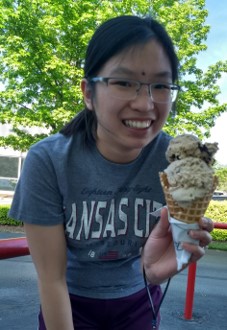Hi! I am a 6th year PhD student originally from Lincolnwood, IL. I attended Loyola University Chicago for my Bachelor of Science in Biochemistry with minors in Psychology and Chemistry. Afterwards, I worked at Northwestern Feinberg School of Medicine as a research technologist in Karla Satchell’s lab before coming to IU for graduate school.
Outside of working in the lab, I enjoy playing sports, baking, and crafting (knitting/crocheting, painting, etc.)!
You can email me at: jewong@indiana.edu
_________________________________________________________________________________________
Recent accomplishment: President’s Diversity Dissertation Fellowship (awarded April 2020)
Project: Developing Targeted Cytotoxic Therapeutics to Treat Cancer
Folates serve as important one-carbon donors in de novo biosynthesis of purines and thymidylate, amino acid biosynthesis and metabolism, and biological methylation reactions from S-adenosylmethionine. These biosynthetic pathways are vital for cell proliferation events including tumor growth and T-cell lymphocyte activation. Folate-utilizing enzymes are therefore key targets for treatment of cancer and inflammatory diseases. FDA approved antifolate drugs to treat certain cancers include methotrexate and pemetrexed (Alimta®). However these drugs lack specific targeting to disease tissue and cause serious cytotoxic side effects. To improve targeting to only affect diseased tissue and alleviate toxic side effects, we have developed a series of targeted cytotoxic therapeutics (TCTs), termed AGFs. Each AGF molecule is characterized by a series of cell proliferation and cell protection assays to determine the mode of transport into the cell and its intracellular targets. A subset of our AGFs is transported via folate receptors that are overexpressed in specific cancers and activated macrophages. We further characterize these AGFs with in vitro inhibition assays and crystallization of the target-inhibitor complexes. We found individual and dual inhibition of β-glycinamide ribonucleotide formyltransferase (GARFTase) and 5-aminoimidazole-4-carboxamide ribonucleotide formyltransferase/inosine monophosphate cyclohydrolase (ATIC), enzymes required in de novo purine synthesis. Additionally, we observed that our AGFs are more potent in cell-based assays than in in vitro inhibition assays, suggesting that our molecules may undergo additional modifications in cells. Folates undergo polyglutamylation once entering the cell to increase cellular retention. We further characterized our AGF molecules with purified folylpoly-γ-glutamate synthase (FPGS) and observed di- and tri-glutamylated forms of AGF after mass spectrometry analysis. Our results show that AGFs target disease tissue and inhibit de novo purine synthesis. We will continue to characterize these molecules and develop additional, more potent, molecules as leads for pre-clinical trials in for cancers with an emphasis on ovarian cancer.
You can find more information about this work under our lab publications tab.



 The College of Arts
The College of Arts